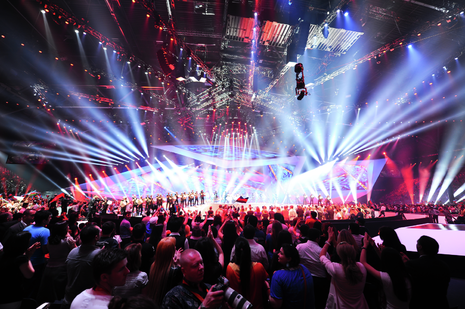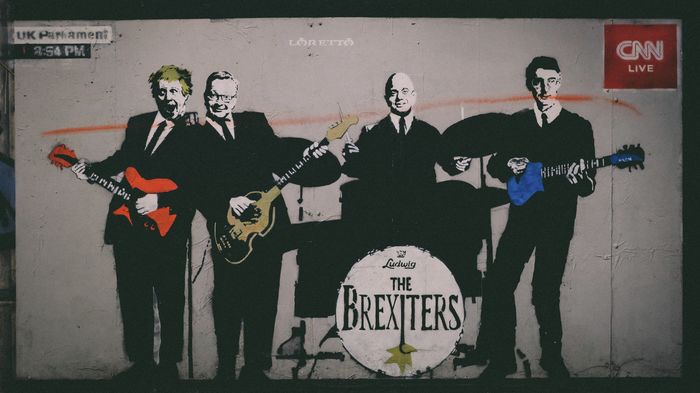Without Mass Spectacle, What is the Eurovision Song Contest?
Amy Moorhouse asks whether the international contest can survive in a virtual format

In May 2009, I discovered a musical Olympics, something which sparked a rather passionate and long-lasting love for that extraordinary spectacle of a show. That particular year Norway won with a song titled Fairytale, perhaps fitting for the magical and irresistible excess and escape that Eurovision is for so many. With oceans of lights, fireworks and even the odd flying acrobat, the contest has continued to expand and become ever more extravagant over the past decade. Last year Eurovision fans were bereft, as the pandemic forced the event into its first ever cancellation. With the assistance of some ever so eager and compliant friends, I was forced to host my own Eurovision celebration to fill the void. However, this year the contest has vowed to return on the 18th May in Rotterdam, albeit in a more limited form.
The organisers of Eurovision released four possible scenarios, which they rather uncreatively named options A, B, C and D. Option A (a completely normal show) was ruled out at the beginning of the month, leaving three possible incarnations of the contest. Option B plans for a socially distant event with the participants still being present in Rotterdam and a limited audience. Option C prepares for acts to remain in their home countries and compete by performances that will be ‘live-on-tape’, while the hosts present to a limited crowd in Rotterdam. The last resort is option D – a plan for if the Netherlands are forced to re-enter lockdown – which would involve the show becoming completely virtual.
As of yet, it is not certain which scenario will come to bear, with organisers quoted as being “determined but realistic”. What is known for sure is a packed arena and sea of colourful flags, while very much part of the modern Eurovision experience, will not be taking place this year. This has led some to ask what atmosphere of magic or joy can be created in an empty arena? As well as, perhaps more pertinently, what is Eurovision without its mass spectacle?
“At the heart of Eurovision is a message of unity and inclusivity, celebrated for one night through the medium of music”
To understand the Eurovision Song Contest truly, one must consider its first iteration, held in Switzerland in 1956, when seven nations competed with a live orchestra to be crowned musically victorious. Simple on the surface, but in actuality this was an immense technological and political effort to unite a divided post-war Europe through the means of the new technological marvel: live television! This was a hugely ambitious project to join countries in an international network, which has only expanded over the years to becoming consistently one of the world’s most watched non-sporting events, exemplified by the 182 million people who watched the 2019 show.
The Eurovision Song Contest is a show designed to reflect the Europe of the moment and has always adapted to the challenges it faced, such as at the end of the Cold War. Many newly formed states were created across eastern Europe and thus sought to join the contest; as a result, semi-finals were introduced to allow for widening participation. While the exterior may have grown ever flashier over 60 years, at the heart of Eurovision is a message of unity and inclusivity, celebrated for one night through the medium of music. Arguably a message of unity in times of adversity is needed now more than ever.
Therefore, while Eurovision will undoubtedly look different this year, it has already proved its ability to adapt and cater for the moment. Perhaps this year’s contest will offer us a chance to reflect on the origins and purpose of the show. On the other hand, it may provide a perfect night of escapism. Ultimately, whether the show is the pinnacle of your year or simply a laugh in a time in which joy is in short supply, let us embrace whatever form Eurovision will take.
 News / Cambridge welcomes UK rejoining the Erasmus scheme20 December 2025
News / Cambridge welcomes UK rejoining the Erasmus scheme20 December 2025 News / CUP announces funding scheme for under-represented academics19 December 2025
News / CUP announces funding scheme for under-represented academics19 December 2025 News / News in Brief: humanoid chatbots, holiday specials, and harmonious scholarships21 December 2025
News / News in Brief: humanoid chatbots, holiday specials, and harmonious scholarships21 December 2025 News / SU reluctantly registers controversial women’s soc18 December 2025
News / SU reluctantly registers controversial women’s soc18 December 2025 News / King appoints Peterhouse chaplain to Westminster Abbey22 December 2025
News / King appoints Peterhouse chaplain to Westminster Abbey22 December 2025









